A subscription to the Wall Street Journal costs several hundred dollars a year, so most people out there don’t get it and DollarCollapse.com rarely posts links to its articles. But everybody should see today’s edition, which probably sets the modern-day record for disturbing headlines. Here’s a sampling of what subscribers read this morning:
Mortgage crisis
Recession-Plagued Nation Demands New Bubble To Invest In
If the situation would not be so damn serious, this would be very funny.
Maybe it’s still funny, if you “Always look on the bright side of life”.
Related video: – How the markets really work
___________________________________________________________________________________
WASHINGTON – A panel of top business leaders testified before Congress about the worsening recession Monday, demanding the government provide Americans with a new irresponsible and largely illusory economic bubble in which to invest.
“What America needs right now is not more talk and long-term strategy, but a concrete way to create more imaginary wealth in the very immediate future,” said Thomas Jenkins, CFO of the Boston-area Jenkins Financial Group, a bubble-based investment firm. “We are in a crisis, and that crisis demands an unviable short-term solution.”
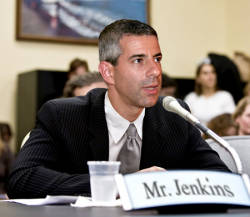
A prominent finance expert asks Congress to help Americans rebuild their ficticious dreams.
The current economic woes, brought on by the collapse of the so-called “housing bubble,” are considered the worst to hit investors since the equally untenable dot-com bubble burst in 2001. According to investment experts, now that the option of making millions of dollars in a short time with imaginary profits from bad real-estate deals has disappeared, the need for another spontaneous make-believe source of wealth has never been more urgent.
“Perhaps the new bubble could have something to do with watching movies on cell phones,” said investment banker Greg Carlisle of the New York firm Carlisle, Shaloe & Graves. “Or, say, medicine, or shipping. Or clouds. The manner of bubble isn’t important-just as long as it creates a hugely overvalued market based on nothing more than whimsical fantasy and saddled with the potential for a long-term accrual of debts that will never be paid back, thereby unleashing a ripple effect that will take nearly a decade to correct.”
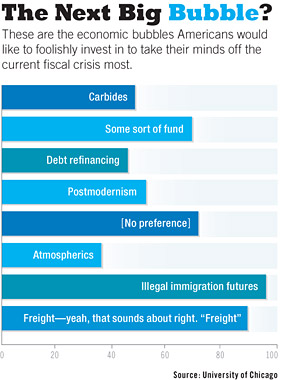
“The U.S. economy cannot survive on sound investments alone,” Carlisle added.
Read moreRecession-Plagued Nation Demands New Bubble To Invest In
Jim Rogers: Fannie Plan a `Disaster’; Goldman Says Sell
The U.S. economy is in a recession, possibly the worst since World War II, Rogers said.
“They’re ruining what has been one of the greatest economies in the world,” Rogers said. Bernanke and Paulson “are bailing out their friends on Wall Street but there are 300 million Americans that are going to have to pay for this.”

July 14 (Bloomberg) — The U.S. Treasury Department’s plan to shore up Fannie Mae and Freddie Mac is an “unmitigated disaster” and the largest U.S. mortgage lenders are “basically insolvent,” according to investor Jim Rogers.
Taxpayers will be saddled with debt if Congress approves U.S. Treasury Secretary Henry Paulson‘s request for the authority to buy unlimited stakes in and lend to Fannie Mae and Freddie Mac, Rogers said in a Bloomberg Television interview. Rogers is betting that Fannie Mae shares will keep tumbling.
Goldman Sachs Group Inc. analyst Daniel Zimmerman said the mortgage finance companies’ shares may fall another 35 percent and lowered his share-price estimate for Fannie Mae to $7 from $18 and for Freddie Mac to $5 from $17. Freddie Mac fell 64 cents, or 8.3 percent, to $7.11 in New York Stock Exchange trading, while Fannie Mae fell 52 cents, or 5.1 percent, to $9.73.
“I don’t know where these guys get the audacity to take our money, taxpayer money, and buy stock in Fannie Mae,” Rogers, 65, said in an interview from Singapore. “So we’re going to bail out everybody else in the world. And it ruins the Federal Reserve’s balance sheet and it makes the dollar more vulnerable and it increases inflation.”
The chairman of Rogers Holdings, who in April 2006 correctly predicted oil would reach $100 a barrel and gold $1,000 an ounce, also said the commodities bull market has a “long way to go” and advised buying agricultural commodities.
`Solvency Crisis’
Read moreJim Rogers: Fannie Plan a `Disaster’; Goldman Says Sell
Citigroup’s $1.1 Trillion in Mysterious Shadow Assets

July 14 (Bloomberg) — At an investor presentation in May, Citigroup Inc. Chief Executive Officer Vikram Pandit said shrinking the bank’s $2.2 trillion balance sheet, the biggest in the U.S., was a cornerstone of his turnaround plan.
Nowhere mentioned in the accompanying 66-page handout were the additional $1.1 trillion of assets that New York-based Citigroup keeps off its books: trusts to sell mortgage-backed securities, financing vehicles to issue short-term debt and collateralized debt obligations, or CDOs, to repackage bonds.
Now, as Citigroup prepares to announce second-quarter results July 18, those off-balance-sheet assets, used by U.S. banks to expand lending without tying up capital, are casting a shadow over earnings. Since last September, at least $100 billion of assets have flooded back onto Citigroup’s balance sheet, accompanied by more than $7 billion of losses.
“If you start adding up all the potential exposures, it’s a huge number,” said Sam Golden, a former ombudsman for the U.S. Office of the Comptroller of the Currency who now heads the financial-industry practice for restructuring adviser Alvarez & Marsal in Houston. “The banks will say that it was disclosed. Investors are saying, `Yeah, but it was cryptic. We really didn’t know what you were telling us.”’
U.S. banks already are reeling from more than $165 billion of writedowns and credit losses, so shareholders are wary of unknown obligations that might force them to take responsibility for additional troubled assets. The risks have become so obvious that accounting officials are proposing new rules — some of which Citigroup opposes — that would force many assets back onto balance sheets.
Read moreCitigroup’s $1.1 Trillion in Mysterious Shadow Assets
Fed: No more bailouts, except Fannie Mae and Freddie Mac
This is article very important, because…
“The credit crisis has obviously entered into a new phase – the government has one bailout left in them, and this is it,” said Jeffrey Gundlach, chief investment officer of TCW Group in Los Angeles, which invests $160 billion.
And now all the related articles below make much more sense and here comes the meltdown of the financial markets.
If you do not know how to prepare yourself: Solution
If you want to know more on what is going on: World Situation
Take care. – The Infinite Unknown
____________________________________________________________________________________
NEW YORK – The U.S. government is signaling it won’t throw a lifeline to struggling financial companies – except for mortgage linchpins Fannie Mae and Freddie Mac – marking a shift to a new and potentially more volatile phase of the credit crisis.
Such an approach could mean beaten-down investment banks like Lehman Brothers Holdings Inc. and regional banks must now fend for themselves as they try to recover from billions of dollars in mortgage-related losses. That is bound to unnerve an already turbulent Wall Street and make investors even more anxious as they await financial companies’ earnings reports that are expected to be down a stunning 69 percent from a year ago when all the numbers are in.
Related articles and videos:
– More Than 300 US Banks to Fail, Says RBC Capital Markets Analyst
– Run on banks spells big trouble for US Treasury
– US: Total Crash of the Entire Financial System Expected, Say Experts
– The Dollar is doomed and the Fed will fail
– Fannie, Freddie insolvent, Poole tells Bloomberg
– Foreclosures Rose 53% in June, Bank Seizures Triple
– Small Banks: Billions in Troubled Construction Loans
– Financial market losses could top 1,600 billion dollars: report
– Dow suffers worst 1st half since ‘70
– Fortis Bank Predicts US Financial Market Meltdown Within Weeks
– Barclays warns of a financial storm as Federal Reserve’s credibility crumbles
– Jim Rogers: Avoid The Dollar At All Costs
– Ron Paul on Iran and Energy June 26, 2008
– Marc Faber: ‘Misleading’ Fed Should Let Banks Fail
– This recession could easily tip into a depression
And, for consumers already squeezed by tightening credit standards, it could mean getting a mortgage will become even harder.
Read moreFed: No more bailouts, except Fannie Mae and Freddie Mac
This recession could easily tip into a depression
The experience of the 1930s makes me think that the present downturn will be relatively long and difficult
Today I am celebrating my 80th birthday, an age that seems less formidable when one has reached it than when one can see it only from afar.
I was born on July 14, 1928, about 15 months before the American boom of the 1920s came to its rather abrupt end. Like everyone else, I am naturally curious to see whether the global credit crunch is going to be a brief interruption in global prosperity, or the prelude to a longer and deeper depression.
I cannot claim to have clear memories of the 1929 Wall Street Crash, which occured when I was 1year old, or of Britain leaving the gold standard in 1931, when I was 3 years old.
I do however, remember newspaper articles about the later stages of the Depression. In the 1930s, my parents read The Times, the Financial Times and the Daily Mail.
Related articles and videos:
– More Than 300 US Banks to Fail, Says RBC Capital Markets Analyst
– Run on banks spells big trouble for US Treasury
– US: Total Crash of the Entire Financial System Expected, Say Experts
– The Dollar is doomed and the Fed will fail
– Fannie, Freddie insolvent, Poole tells Bloomberg
– Foreclosures Rose 53% in June, Bank Seizures Triple
– Small Banks: Billions in Troubled Construction Loans
– Financial market losses could top 1,600 billion dollars: report
– Dow suffers worst 1st half since ‘70
– Fortis Bank Predicts US Financial Market Meltdown Within Weeks
– Barclays warns of a financial storm as Federal Reserve’s credibility crumbles
– Jim Rogers: Avoid The Dollar At All Costs
– Ron Paul on Iran and Energy June 26, 2008
– Marc Faber: ‘Misleading’ Fed Should Let Banks Fail
I can remember the news stories of the Jarrow march of the unemployed. I also remember discussing with my mother a lead story which reported that farm workers’ pay was to be raised 6d (2p) to what would now be £1.50 a week. The depression was a fact of existence in the North Somerset coalfield up to the outbreak of war in 1939.
Fortunately, there has only been one Great Depression in my lifetime, but there has also been a Great Inflation. In 2006 Pickering and Chatto, which I refounded in the 1980s, had the good timing to publish a three-volume History of Financial Disasters, under the general editorship of Mark Duckenfield.
More Than 300 US Banks to Fail, Says RBC Capital Markets Analyst
NEW YORK, July 13 (Reuters) – U.S. banks may fail in far greater numbers following the collapse of the big mortgage lender IndyMac Bancorp Inc, straining a financial system seeking stability after years of lending excesses.
More than 300 banks could fail in the next three years, said RBC Capital Markets analyst Gerard Cassidy, who had in February estimated no more than 150.
Related articles and video:
– Fed: No more bailouts, except Fannie Mae and Freddie Mac
– Run on banks spells big trouble for US Treasury
– US: Total Crash of the Entire Financial System Expected, Say Experts
– The Dollar is doomed and the Fed will fail
– Jim Rogers: Fannie Plan a `Disaster’; Goldman Says Sell
Banks face pressure as credit losses once concentrated in subprime mortgages spread to other home loans and debt once-thought safe. This has also led to investor worries about the stability of mortgage finance companies Fannie Mae and Freddie Mac; IndyMac is not related to either.
Read moreMore Than 300 US Banks to Fail, Says RBC Capital Markets Analyst
Chinese Government is Top Foreign Holder of Fannie Mae, Freddie Mac Bonds
$376 Billion in Chinese Agency Bond Holdings Subject to Taxpayer Bailout Proposals According to FreedomWorks Analysts
![]()
WASHINGTON, Jul 11, 2008 (BUSINESS WIRE) — As politicians call for taxpayer bailouts and a government takeover of troubled mortgage lenders Freddie Mac and Fannie Mae, FreedomWorks would like to point out that a bailout is a transfer of possibly hundreds of billions of U.S. tax dollars to sophisticated investors and governments overseas.
The top five foreign holders of Freddie and Fannie long-term debt are China, Japan, the Cayman Islands, Luxembourg, and Belgium. In total foreign investors hold over $1.3 trillion in these agency bonds, according to the U.S. Treasury’s most recent “Report on Foreign Portfolio Holdings of U.S. Securities.”
FreedomWorks President Matt Kibbe commented, “The prospectus for every GSE bond clearly states that it is not backed by the United States government. That’s why investors holding agency bonds already receive a significant risk premium over Treasuries.”
“A bailout at this stage would be the worst possible outcome for American taxpayers and mortgage holders, who have been paying a risk premium to these foreign investors. It would change the rules of the game retroactively and would directly subsidize the risks taken by sophisticated foreign investors.”
“A bailout of GSE bondholders would be perhaps the greatest taxpayer rip-off in American history. It is bad economics and you can be sure it is terrible politics.”
SOURCE: FreedomWorks
Last update: 11:08 a.m. EDT July 11, 2008
Source: Market Watch
Run on banks spells big trouble for US Treasury
IN A modern financial system nothing is more frightening than a run on the bank. The US has now suffered a series of them, and they are escalating in size and scope, posing a serious threat to an already reeling economy.
Rumours swamped financial markets on Friday that the US Government would be forced to step in to aid the mortgage finance giants Fannie Mae and Freddie Mac, which together own or guarantee $US5 trillion ($5.16 trillion) in US home loans.
In Wall Street’s version of a run on the bank, investors drove Fannie Mae and Freddie Mac shares to 17-year lows, signalling a gnawing lack of faith in the companies’ ability to survive rising mortgage defaults without the Government’s help.
Later on Friday regulators took over IndyMac Bank of Pasadena, saying the $US32 billion lender had collapsed under the weight of bad home loans and withdrawals by spooked depositors. It was the second-largest bank to fail in US history.
Friday’s events were felt around the world, knocking the battered US dollar lower and driving up interest rates.
“This is a flare-up in the financial forest fire that is far beyond anything we’ve seen before,” said Christopher Low, chief economist at the investment firm FTN Financial in New York.
It is triggering worries that would have been unthinkable even a year ago, including that the US Treasury’s debt might lose its AAA credit grade because of heavy blows to the nation’s fiscal health from the housing mess.
Four months ago many on Wall Street believed they had seen the worst of the credit crisis rooted in the housing market’s woes. The collapse in March of the brokerage Bear Stearns, a central player in the business of packaging dicey mortgages for sale to investors, was the kind of prominent calamity that has historically marked the end of financial crises.
Bank Failure: IndyMac Bank seized by federal regulators
The Pasadena-based thrift’s failure is the second-biggest by a U.S. bank. Doors will reopen Monday.
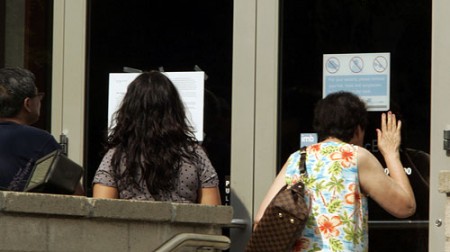
The federal government took control of Pasadena-based IndyMac Bank on Friday in what regulators called the second-largest bank failure in U.S. history.
Citing a massive run on deposits, regulators shut its main branch three hours early, leaving customers stunned and upset. One woman leaned on the locked doors, pleading with an employee inside: “Please, please, I want to take out a portion.” All she could do was read a two-page notice taped to the door.
The bank’s 33 branches will be closed over the weekend, but the Federal Deposit Insurance Corp. will reopen the bank on Monday as IndyMac Federal Bank, said the Office of Thrift Supervision in Washington. Customers will not be able to bank by phone or Internet over the weekend, regulators said, but can continue to use ATMs, debit cards and checks. Normal branch hours, online banking and phone banking services are to resume Monday.
Federal authorities estimated that the takeover of IndyMac, which had $32 billion in assets, would cost the FDIC $4 billion to $8 billion. Regulators said deposits of up to $100,000 were safe and insured by the FDIC. The agency’s insurance fund has assets of about $52 billion.
Related article: US: Total Crash of the Entire Financial System Expected, Say Experts
IndyMac’s failure had been widely expected in recent days. As the bank was shuttering offices and laying off employees to cope with huge losses from defaulted mortgages made at the height of the housing boom, nervous depositors were pulling out $100 million a day. The bank’s stock price had plummeted to less than $1 as analysts predicted the company’s imminent demise.
The takeover of IndyMac came amid rampant speculation that the federal government would also have to take over lenders Fannie Mae and Freddie Mac, which together stand behind almost half of the nation’s mortgage debt.
Shares of the two mortgage giants have nose-dived this week and fell again Friday, helping to drag down the Dow Jones industrial average 128.48 points, or 1.1%, to close at 11,100.54. Investors and analysts are concerned that the two government-chartered companies need to raise billions of dollars to offset expected losses stemming from mortgage defaults, but will be unable to do so in the private market. Officials in Washington spent most of Friday trying to knock down rumors of a government bailout.
Read moreBank Failure: IndyMac Bank seized by federal regulators
Fannie, Freddie insolvent, Poole tells Bloomberg
(Reuters) – Mortgage lenders Fannie Mae and Freddie Mac are “insolvent” and may need a U.S. government bailout, former St. Louis Federal Reserve President William Poole was quoted as saying in an interview with Bloomberg.
“Congress ought to recognize that these firms are insolvent, that it is allowing these firms to continue to exist as bastions of privilege, financed by the taxpayer,” Poole was quoted as saying in an interview held on Wednesday.
Chances are increasing that the government may need to bail out the two mortgage companies, Poole was quoted as saying.
Shares of the two companies have taken a beating recently on worries about whether they can withstand more losses and support housing as well as concerns that they may need to raise massive amounts of new capital.
Freddie Mac shares tumbled 23.8 percent to $10.26 on the New York Stock Exchange on Wednesday, while Fannie Mae shares sank 13.1 percent to $15.31.
Related article: US: Total Crash of the Entire Financial System Expected, Say Experts
Foreclosures Rose 53% in June, Bank Seizures Triple

July 10 (Bloomberg) — U.S. foreclosure filings rose 53 percent in June from a year earlier and bank repossessions increased the most since RealtyTrac Inc. began collecting data in January 2005 as deteriorating property values forced more people to give up their homes.
One in every 501 U.S. households either lost the home to foreclosure, received a default notice or was warned of a pending auction, RealtyTrac, an Irvine, California-based seller of default data, said today in a statement. Bank seizures rose 171 percent.
“The foreclosure problem is getting worse and will stay with us well into the next decade,” Mark Zandi, chief economist for Moody’s Economy.com in West Chester, Pennsylvania, said in an interview. “The job market is eroding and homeowners have less equity. Lenders are much less willing to work with you if you’ve got negative equity, and you’re more likely to give up your house if you’re deeply underwater.”
Foreclosure activity is the highest since the Great Depression of the 1930s, said Rick Sharga, RealtyTrac’s vice president of marketing. Home prices, which fell the most on record in April, according to the S&P/Case-Shiller index of 20 U.S. metropolitan areas, have created a cycle where shrinking equity drives homeowners into foreclosure, which in turn further pushes down home prices, Sharga said.
`Faster Pace’
Read moreForeclosures Rose 53% in June, Bank Seizures Triple
Pension plans suffer huge losses
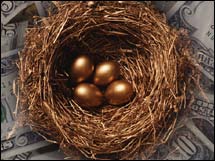
Report says weak markets, credit crunch have drained $280 billion from plans of largest U.S. companies
NEW YORK (CNNMoney.com) — Falling stock markets around the globe and the credit crunch are putting the pension funds of some of the largest U.S. companies into deeper financial holes, according to a report released Monday.
Since the credit crunch hit last fall, pension plans funded by S&P 1500 companies have lost about $280 billion in assets, according to an actuary at Mercer, a human resources consulting firm.
On paper, the losses from last October tally $160 billion. However, according to Mercer actuary Adrian Hartshorn, the asset losses are closer to $280 billion when pension plan assets and liabilities are considered together. The losses amount to about 7% of a total $4 trillion in pension plan assets.
Companies should be concerned, he said, because – assuming no change in the market – a typical U.S. company can expect their pension expenses to increase between 20% and 30% in 2009. That’s due to the higher cost of servicing the pension plan’s debt and the smaller return from the plan’s assets.
“I think it’s important for corporations to be aware of what’s going on in their pension plans, as corporations would be concerned when any part of its business is performing badly,” Hartshorn said.
According to the report, the total losses on pension assets and liabilities from the last day of 2007 through the end of June has grown to more than $80 billion.
Part of the loss has been reflected in companies’ current financial statements, but many losses incurred since the end of 2007 have yet to hit company balance sheets.
Fannie, Freddie Shares Plummet on Capital Worries
Shares of Fannie Mae and Freddie Mac, the largest providers of funding for U.S. home mortgages, closed at their lowest levels since 1992 on concern the companies need to raise more capital amid larger-than-expected losses.
Corporate “federal agency” debt obligations and mortgage-backed securities guaranteed by the companies also plummeted relative to government debt as investors thinned positions, analysts said.
Freddie Mac
|
||
| Quote | Chart | News | Profile |
[FRE 11.91  -2.59 (-17.86%)
-2.59 (-17.86%) ![]() ] stock tumbled almost 18 percent Monday, to $11.91, while Fannie Mae
] stock tumbled almost 18 percent Monday, to $11.91, while Fannie Mae
|
||
| Quote | Chart | News | Profile |
[FNM 15.74  -3.04 (-16.19%)
-3.04 (-16.19%) ![]() ] shares dropped most than 16 percent, to $15.74.
] shares dropped most than 16 percent, to $15.74.
A pending accounting change could also force Freddie Mac and Fannie Mae to raise capital at a difficult time, according to Lehman Brothers.
The rule aimed at forcing companies to account for securitized assets on their balance sheets could mandate Freddie Mac and Fannie Mae to boost capital by $29 billion and $46 billion, respectively, the analysts wrote in a client note on Monday.
Small Banks: Billions in Troubled Construction Loans
Wall Street is bracing for regional and small banks to fess up to large losses from their mounting volume of soured construction loans made primarily to home builders.
According to the Federal Deposit Insurance Corp., $45.4 billion of the $631.8 billion in construction loans outstanding at the end of the first quarter were delinquent. When banks announce second-quarter results in coming weeks, they are expected to report sharp increases in loans that builders can’t repay. Banks are also facing intensifying pressure from federal and state regulators to deal with the problem loans on their books.
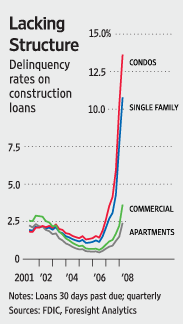
WHICH BANKS WILL FEEL THE PAIN?
See a sortable list of small and regional banks with sizable exposure to construction and land loans and with notable delinquency rates.
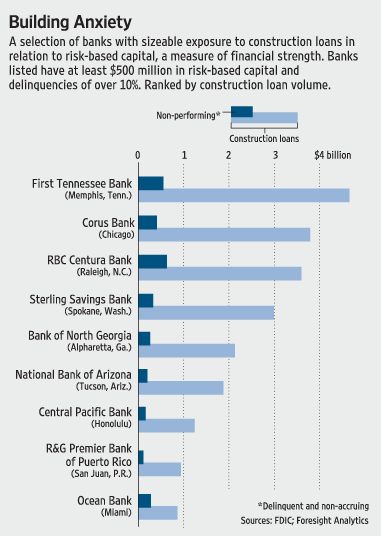
That will put additional pressure on an already stressed financial system. Banks have begun to dump bad construction and land loans at discounts, curtail new lending and halt construction projects that are under way to preserve capital. Some analysts even see a wave of bank failures as a possibility.
Read moreSmall Banks: Billions in Troubled Construction Loans
Financial market losses could top 1,600 billion dollars: report
Geneva – The global financial crisis could lead to losses of 1,600 billion dollars for financial institutes, according a report in the Swiss Sunday newspaper SonntagsZeitung. It quoted a confidential study by the hedge fund Bridgewater Associates as saying losses for banks holding risky assets could be four times greater than the 400 billion dollars previously estimated.
The hedge fund expressed doubts that the financial institutes would be able to drum up enough funds to cover the losses, something it said could exacerbate the crisis. Bridgewater, one of the world’s biggest hedge funds, based its calculations on the state of risky debt-based US assets, such as mortgages, credit and credit card demands. The value of such risky assets is 26,600 billion dollars, according to the hedge fund. The losses would amount to 1,600 billion dollars if these assets were valued at market rates and not in the form of securitization, the newspaper said.
Sun, 06 Jul 2008
DPA
Source: The Earth Times
US: Total Crash of the Entire Financial System Expected, Say Experts
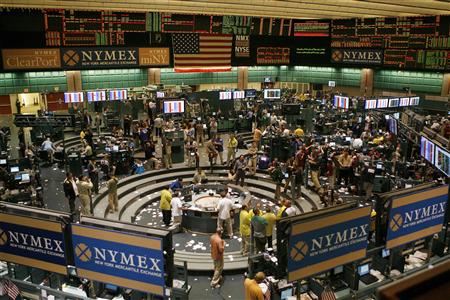
Investors are fleeing from the U.S. stock market, Sending the Dow to Worst June Since Depression, looking for places to secure their wealth.
There is an unprecedented cash flow of ‘hot money’, which is usually defined as short-term global speculative funds moving among financial markets in search of the highest short-term return, moving into China:
Is China flooded with ‘hot money’ because of an expected meltdown in the U.S.?
Let’s further examine the prospects that we would experience a total crash of the entire financial system:
– Fortis Bank Predicts US Financial Market Meltdown Within Weeks
We have seen the Dow suffering it’s worst 1st half since ‘70 accompanied by a lot of bad news for the economy like:
– US: Big Trouble for General Motors, Crysler and Ford
– America’s Aviation System About To Collapse
– Starbucks to cut as many as 12,000 positions
And now the corporations are cheating you at the supermarkets: America’s Shrinking Groceries
The Dollar is being destroyed by the Federal Reserve, which has created in the last three years 4 Trillion Dollars of new money out of thin air: Ron Paul on Iran and Energy June 26, 2008
Ron Paul is further warning that: This coming crisis is bigger than the world has ever experienced
and that: We are at the beginning of a huge Dollar bubble.
The US Federal Reserve intentionally created inflation and that is why its credibility has fallen “below zero” and that is why Barclays warns of a financial storm as Federal Reserve’s credibility crumbles.
More dire warnings:
– RBS issues global stock and credit crash alert
– Morgan Stanley warns of ‘catastrophic event’ as ECB fights Federal Reserve
– Central bank body warns of Great Depression
– Credit crisis expands, hitting all kinds of consumer loans
– How Low Can The Dollar Go? Zero Value
Investors like Jim Rogers are telling us to “Avoid The Dollar At All Costs” and have told us that the Federal Reserve will fail and that Bernanke should be fired (alhough that isn’t possible because of his contract), because he has created the worst recession in the end and thats why he said: “Abolish the FED” on CNBC 2008.03.12.
The Fed is only doing good for the big corporations on Wall Street. If you would continuously come close to bankruptcy, because you have irresponsibly wasted your money, who will continuously give you billions of Dollars and bail you out, because you might fail? So I agree totally with Marc Faber: ‘Misleading’ Fed Should Let Banks Fail.
Well those corporations are said to be to “Big to Fail”, but they eventually will fail, because the entire system will fail and the Dollar is being destroyed in the process and so the people will end up with nothing, because their life savings are worthless paper. You are already paying the price for this policy, but maybe you haven’t looked at it that way:
The Price Of Food: 2007 – 2008
What inflation really is, is a taxation on monetary assets. And guess who is paying for all of that?
I just love this video. A must see:
The Stock Market and the Monetary System are on the verge of collapse!
Read moreUS: Total Crash of the Entire Financial System Expected, Say Experts
Is China flooded with ‘hot money’ because of an expected meltdown in the U.S.?
Related articles and videos:
– Ron Paul: This coming crisis is bigger than the world has ever experienced
– Dow suffers worst 1st half since ‘70
– Fortis Bank Predicts US Financial Market Meltdown Within Weeks
– Barclays warns of a financial storm as Federal Reserve’s credibility crumbles
– Jim Rogers: Avoid The Dollar At All Costs
– Ron Paul on Iran and Energy June 26, 2008
– Marc Faber: ‘Misleading’ Fed Should Let Banks Fail
BEIJING, July 1 (Xinhua) — China has taken a series of increasingly aggressive measures in the past several months to blunt the impact of so-called “hot money,” amid the explosive growth of its foreign exchange reserves, which have soared beyond what can be explained by trade and investment flows.
The inflows have been so massive as to raise alarms over the country’s financial security.
According to the State Administration of Foreign Exchange (SAFE), as of the end of May, forex reserves stood at 1.797 trillion U.S. dollars.
During the first five months of 2008, forex reserves increased by 18.7 percent year-on-year, or 268.7 billion U.S. dollars, SAFE figures showed.
Where is all that money coming from, and where is it going?
HOW MUCH IS “HOT MONEY”?
What caught the attention of analysts was that forex reserves jumped at the same time as the current-account surplus and foreign direct investment (FDI) into the fixed-asset field declined year-on-year.
Set against the increased forex reserves in the first five months of this year, there was the 78.02 billion U.S. dollars represented by the trade surplus, which was down 8.6 percent year-on-year.
Another 42.78 billion U.S. dollars was connected with FDI in the first five months, which soared nearly 55 percent year-on-year. But FDI going into fixed assets (longer-term investment), actually fell 3.5 percent in the same period.
Jiang Zheng, a macro-economist at a Beijing-based securities firm, has closely tracked these figures and analyzed the data.
Deducting the trade surplus and the FDI, there was an unexplained 147.9 billion U.S. dollars in the forex reserve increase figure, which Jiang and numerous other analysts consider to be “hot money”, which is usually defined as short-term global speculative funds moving among financial markets in search of the highest short-term return.
The government doesn’t release official figures on this category of funds; in fact, it doesn’t even use the term “hot money”. So analysts can only make estimates.
Jiang said the “hot money” figures deduced by analysts might even be underestimates. “There is a tricky decline among the FDI figures, i.e. the drop of fixed-asset investment,” he explained.
“Foreign direct investment in the first five months soared about 55 percent. But strangely, fixed-asset FDI in the first five months fell 3.5 percent from last year’s figure,” Jiang said.
Jiang said it appeared that some speculative money had managed to move into China in the guise of FDI.
But there are many other channels for “hot money” to flow into China. These include falsified international trade with over-invoiced exports and underground private banks, according to Jiang.
Jiang and other analysts maintained that as much as 600 billion U.S. dollars in “hot money” had surged into the country, most of it after 2005.
Read moreIs China flooded with ‘hot money’ because of an expected meltdown in the U.S.?
As Bill Evolves, Mortgage Debt Is Snowballing
When Congress started fashioning a sweeping rescue package for struggling homeowners earlier this year, 2.6 million loans were in trouble. But the problem has grown considerably in just six months and is continuing to worsen.
More than three million borrowers are in distress, and analysts are forecasting a couple of million more will fall behind on their payments in the coming year as home prices fall further and the economy weakens.
Those stark numbers not only illustrate the challenges for the lawmakers trying to provide some relief to their constituents but also hint at what the next administration will be facing after the election. While the proposed program would help some homeowners, analysts say it would touch only a small fraction of those in trouble – the Congressional Budget Office estimates it would be used by 400,000 borrowers – and would do little to bolster the housing market.
“It’s not enough, even in the best of circumstances,” said Mark Zandi, chief economist of Moody’s Economy.com. The number of people who will be helped “is going to be overwhelmed by the three million that are headed toward default.”
Credit crunch forcing US middle classes to live in their cars
Homeless people living in cars and motorhomes across the US are being joined by a new breed: the middle class.
As mortgage foreclosures continue to rise, growing numbers of middle-class professionals are losing their homes and downsizing from four bedrooms to four wheels.
With numbers rising, New Beginnings, a homeless agency in Santa Barbara, California, has launched a safe parking scheme, whose aim is to provide a refuge of sorts for those who have nowhere to go other than their vehicle.
Guy Trevor lost his job as an interior designer when the sector contracted thanks to the foreclosure crisis. With his furniture sold and his belongings in storage, he now lives in his car, spending the nights in one of the 12 gated car parks in Santa Barbara run by New Beginnings.
“I see myself as a casualty of a perfect storm,” he said. “The people sleeping at the [car parks] are … just like me. They come from normal, everyday homes. I think a lot of people in this country don’t realise that they, too, are a couple of pay cheques away from destitution.”
In normally affluent Santa Barbara there were 150 foreclosures last month, with a total of 800 for the year ending in May, according to the county assessor’s office, which assesses property for tax purposes.
Each month, an auction of foreclosed properties is held on the steps of the Santa Barbara courthouse.
“The way the economy is going, it’s amazing the people who are becoming homeless. It’s hit the middle class,” Nancy Kapp, of New Beginnings, told CNN.
Another of Kapp’s clients, Barbara Harvey, 67, also lost her job and subsequently her home thanks to the foreclosure crisis. As with Trevor, her job as a loans processor was connected to the housing market.
Harvey now lives with her three dogs in her car, parking at night in a women-only car park run by the agency. “I didn’t think this would happen to me,” she said. “It’s just something that I don’t think that people think is going to happen to them.”
Read moreCredit crunch forcing US middle classes to live in their cars
L.A. seeing more people living out of their cars
LOS ANGELES: Having lost her job and her three-bedroom house, Darlene Knoll has joined the legions of downwardly mobile who are four wheels away from homelessness.
She is living out of her shabby 1978 RV, and every night she has to look for a place to park where she won’t get hassled by the cops or insulted by residents.
“I’m not a piece of trash,” the former home health-care aide said as she stroked one of five dogs in her cramped quarters parked in the waterfront community of Marina del Rey.
Amid the foreclosure crisis and the shaky economy, some California cities are seeing an increase in the number of people living out of their cars, vans or RVs.
As first-time buyers vanish, the lights go out across Britain
House price inflation scared them away. Now prices are falling but they’re still not coming back – undermining the market and putting estate agents and builders out of business. Richard Northedge reports
Like a giant pyramid scheme, the housing market relies on first-time buyers to enable those already on the bottom rung of the ladder to sell their starter homes and climb higher. New blood is needed for the additional funds that will keep the market buoyant.
Yet this vital source of investment has all but dried up. The number of first-timers this year could be the lowest on record. In 1999, almost 600,000 people bought their first property, but then soaring prices started to make homes unaffordable and that number dropped steadily. Last year it stood at 358,000 – its lowest level since 1991.
However, with prices now falling, potential first-timers are still not taking the plunge even though properties are cheaper. On current trends, they will buy barely more than 200,000 homes this year. Indeed, the total could fall below the 198,000 sales recorded in 1974 and be the lowest since records began.
Read moreAs first-time buyers vanish, the lights go out across Britain
Wealthy Investors Shift Funds From Global Banks to Reduce Risks
June 19 (Bloomberg) — High-net worth individuals, those coveted financial-services customers with at least $2 million to invest, are shifting assets from brokerages and large global banks to smaller, more conservative alternatives.
“For the first time in my career, I saw concern about the location of one’s assets,” said Robert Balentine, the head of Wilmington Trust Corp.‘s investment management group. “We’ve seen tangible evidence of very wealthy clients shifting assets out of brokerage firms in great numbers.”
Trust companies like Wilmington are benefiting from record subprime-infected losses at companies led by Zurich-based UBS AG, the world’s biggest money manager for the rich. UBS clients probably withdrew a net $39 billion during the past three months after the company reported more than $38 billion of writedowns and credit-market losses in the past year, London-based analysts at JPMorgan Chase & Co. estimate.
Clients may say “if UBS can’t manage its own capital, then what the hell are they going to do with mine?” said David Maude, a financial services consultant in Verona, Italy, who calls UBS the “Rolls Royce” of the industry. “It does tarnish their reputation, certainly.”
UBS contacted 2.5 million Swiss consumer and wealth- management customers last month after losing 11.5 billion francs ($10.9 billion) in the first quarter and seeing a net withdrawal of 12.8 billion francs in its asset and wealth-management units.
The company has responded with “proactive, ongoing communication” with clients, said Jim Pierce, co-head of UBS’s U.S. Wealth Management Advisory Group, in an e-mailed response to questions. UBS is “willing to have the difficult conversations,” Pierce said.
U.S. Market
Read moreWealthy Investors Shift Funds From Global Banks to Reduce Risks
California Home Foreclosures Skyrocket by Over 400 Percent

(NaturalNews) The number of California homes foreclosed on in the fourth quarter of 2007 was more than 400 percent higher than in the same quarter of 2006, according to DataQuick Information systems.
A total of 31,676 California homes were foreclosed in the last quarter of 2007, compared with only 6,078 in the fourth quarter of the year before. The total number of foreclosures in 2007 was 84,375, or more than six times the 2006 total of 12,672.
It was the most foreclosures since DataQuick began keeping records in 1988, and more than two times the previous high of 15,418 in the third quarter of 1996.
Read moreCalifornia Home Foreclosures Skyrocket by Over 400 Percent
Central bank body warns of Great Depression
The Bank for International Settlements (BIS), the organisation that fosters cooperation between central banks, has warned that the credit crisis could lead world economies into a crash on a scale not seen since the 1930s.
In its latest quarterly report, the body points out that the Great Depression of the 1930s was not foreseen and that commentators on the financial turmoil, instigated by the US sub-prime mortgage crisis, may not have grasped the level of exposure that lies at its heart.
According to the BIS, complex credit instruments, a strong appetite for risk, rising levels of household debt and long-term imbalances in the world currency system, all form part of the loose monetarist policy that could result in another Great Depression.